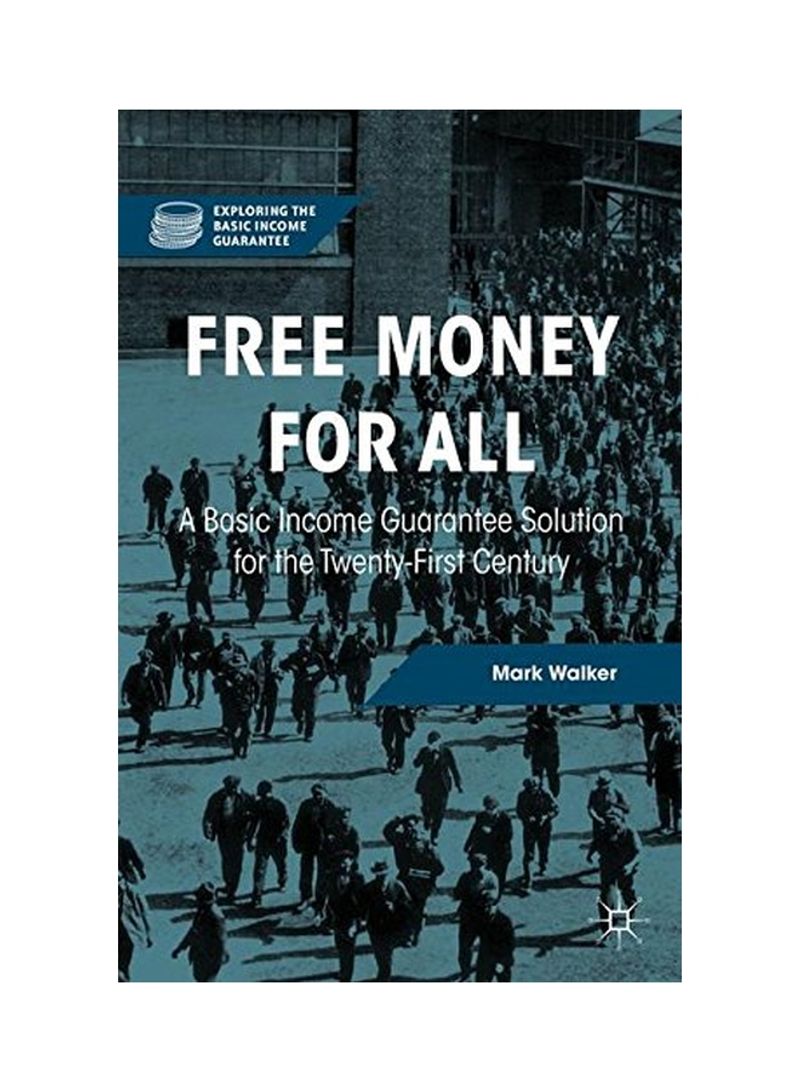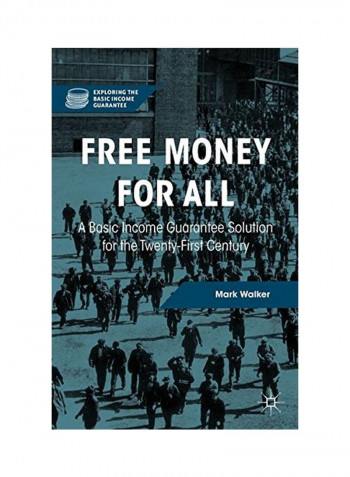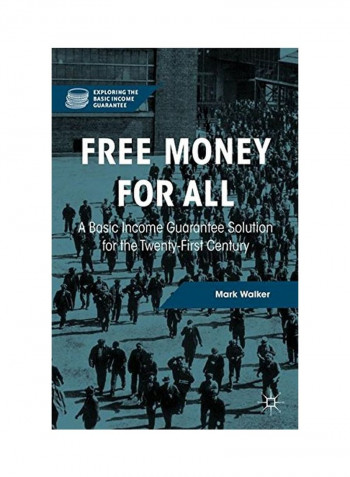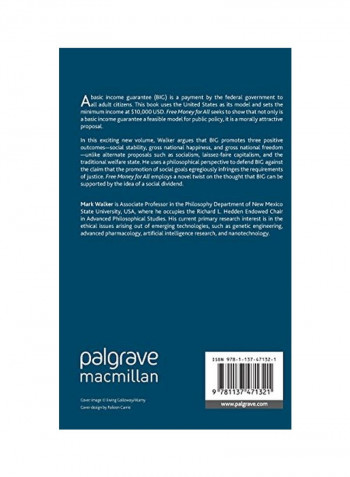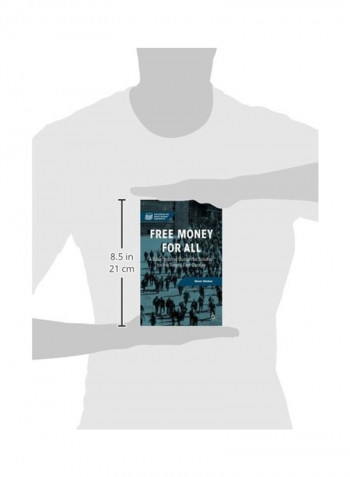Free Money For All Hardcover
Recommend
Sort by
Rating
Date
Specifications
Country of Origin
India
Author 1
Mark Walker
Book Description
Free Money for All makes the case for a basic income guarantee of $10,000 per adult US citizen. The book shows that a basic income guarantee will increase gross national happiness and gross national freedom, while helping to mitigate some of the worst consequences of rising technological unemployment.
ISBN-10
1137471328
ISBN-13
9781137471321
Language
English
Publisher
Palgrave MacMillan
Publication Date
30 Nov 2015
Number of Pages
249
About the Author
Mark Walker is Associate Professor in the Philosophy Department of New Mexico State University, USA, where he occupies the Richard L. Hedden Endowed Chair in Advanced Philosophical Studies. His current primary research interest is in the ethical issues arising out of emerging technologies, such as genetic engineering, advanced pharmacology, artificial intelligence research, and nanotechnology.
Author 2
Mario Baldassarri
Editorial Review
Review 1: Richard K Caputo, PhD., Professor of Social Policy & Research Wurzweiler School of Social Work - Yeshiva University Dr Walker seeks to write a book justifying a basic income guarantee scheme that awards every U.S. citizen $10,000 cash income annually. His proposal has three parts. The first, Chapters 1 and 2, introduce the concept of BIG and how it might be financed. Part II, Chapters 3-7, lays out the 'consequentialist' arguments for BIG (Chapters 3-6) and justifies BIG, somewhat convolutedly in my opinion compared to the other chapters, 'assuming a deontological conception of capitalism' (Chapter 7). Part III, Chapters 8 and 9, address the 'free-rider' problem to and utopian assertions about BIG. The proposed book is meant to appeal to students and the educated general public interested in political philosophy, ethics, and well-being. To his credit, Dr Walker writes with flair that should have popular appeal. The subject might however work better as speculative fiction than as a proposed text for undergrads also written for popular consumption. As I read Dr Walker's proposal, I was often reminded of Robert Heinlein's For Us, The Living and William Morris' News from Nowhere. In any event, I hope that the following provides a sufficient assessment to make a reasonably informed decision about publishing the book either as proposed or with some modifications. Dr Walker makes no mention in his proposal of Charles Murray's The Plan which had a similar objective and a fair amount of public exposure by way of reviews in such national magazines as The Nation and through academic and think-tank forums, one of which I attended. For all practical purposes The Plan went nowhere, much as Murray had publically predicted. Hence, much of Chapters 1 and 2 of Dr Walker's proposal is well trodden territory that has found little traction (both political and popular), evidenced by the likes of Murray and of Al Sheahen whose work Dr Walker does cite and rely on for his figures about costs and financing of BIG. Since Palgrave publishes Sheahen's book which is also designed for popular consumption and a series on BIG geared more to academic or scholarly audiences, perhaps related sales can provide some indication about the marketability of BI books. Dr Walker asserts that to the best of his knowledge Free Money for All will be the first primarily 'consequentialist' defence of the income guarantee. This surprised me since many of those arguing for such guarantees claim that society as a whole would be somehow better with the guarantee than without it, whether for the greater common good, for more equalized access to political influence, greater freedom, and the like. Arguing for Basic Income, published in 1992 and edited by Philippe Van Parijs, one of the founding persons of contemporary efforts advancing the idea of an unconditional basic income and whose name and work are notably absent from Dr Walker's book proposal, has plenty of examples of portended good or desirable consequences that would result from a basic income guarantee. Hence, if the primary market is for academic researchers interested in BIG and distributive justice in general, this proposal based on the 'novelty' of consequentialist arguments per se will seem like more of the same in my estimation. For undergraduate philosophy students, another targeted audience of Dr Walker's proposed book, a 'consequentialist' defence of the income guarantee would seem appropriate and novel. Dr Walker's purported appeals to academic researches include his treatment of happiness economics, freedom, and capitalism. Chapter 3 of the proposal to argues against unbridled capitalism. Since capitalism as we know it has always existed within a legal framework with varying degrees of regulations, more fruitful arguments about justice and capitalism would go well beyond Nozick who classic work seems to be used as straw person to show that capitalism has some negative consequences. Missing is any discussion of the relative weights of positive and negative consequences and how one might go about adjudicating disagreements about what those positives and negative are and what weights to give them. Chapter 4 argues that both physical and mental 'work' will become more of a scarce commodity than at present due to advances in technology. This is a highly speculative chapter, given that new job opportunities have often enough accompanied technological advances, albeit with some displacement and adjustments. The March 29th-April 4th 2014 issue of The Economist has a special 14-page report of the 'Rise of the Robots' which portends a less dramatized impact of job displacement in the reasonably foreseeable future. End-of-work theories have been around for several decades, so I am not sure how Dr Walker's treatment of the issue advances prior speculations about it. To conclude that BIG would be a 'rational bet' in light of uncertainty about the nature of the portended technological revolution (that Dr Walker also contends will replace human minds) seems more like the logic of Pascal's wager about believing in God just in case. It may be a rational choice, but one which it many people seem to avoid or to choose otherwise. Chapter 5 concerns economic happiness, another area of interest meant to appeal to academic researchers interested in BIG. Dr Walker claims in the proposal that economists' notion of happiness is incorrect. Although he mentions that the chapter will provide an overview of how social scientists understand and measure happiness, the 'correct' measure he plans to use is not clearly presented. In the overview, he mentions that happiness economics would need to be reformed to include freedom as part of prudential wellbeing, suggesting a new measure that somehow captures salient aspects of both, but what this measure would look like is not specified. Additional information about how his measure of prudential well-being will or has been subject to validity and reliability checks is also warranted in the chapter. There is nothing in the proposal which suggests that he has done this or will cover such material in the book. Even if he were to do so, however, it is not clear in the proposal how the cause-effect relationship will be treated - this would require some empirical study. To the extent Dr Walker is introducing to the readers a new measure of happiness or prudential well-being, results of his study or of others' studies that use his measure of happiness would warrant inclusion in the chapter. The imaginary net-gain BIG redistribution scenario he sets up, based on marginal utility, that compares 0.5 units lost by Bill Gates to 100,000 units gained by the single parents is difficult to interpret, despite the apparent glaring degree of difference between the two numbers. This is due to the apparent ordinal nature of the measure he is using, a 10-point happiness scale. There is no common metric between any two units within the scale, so other than indicating that one is more or less than the other reads too much into the data. Dr Walker wants readers to believe that the loss to Bill Gates is miniscule compared to that of single parents, but despite the numbers on the scale the suggestion that less in this instance means miniscule is an artefact of the scale not of how Bill Gates perceives or experiences the loss, or what it might otherwise mean to him under the circumstances under which the loss occurred. Chapter 6 discusses Freedom as a political concept, here suggesting that Happiness and Freedom are different, though related, concepts with different measures for each, rather than one measure that captures both which it seemed to me was suggested in Chapter 5. In any event, in Chapter 6 Dr Walker again draws on marginal utility theory this time to argue that BIG increases Freedom, the overall capacity of citizens to make choices and act on them, with larger gains going to those at the bottom of the income ladder than those at the upper end. My critique is similar: Ordinal measures lack a common metric between any two units of measure. Reported differences between two points along the scale are difficult to interpret and what those differences mean in the sense of magnitude is an artefact of the scale. This chapter discusses Socialism as a rival to BIG, but immediately moves to a discussion of productivity. The link between productivity and Freedom eluded me. Presenting 'competitors' to BIG, whether 'laissez-faire capitalism' or socialism, suggested to me that that Dr Walker is using BIG as a theory to describe how economics might work better than the former ('laissez-faire capitalism'), as well as to prescribe what society should look like that surpasses the latter (socialism). This became clearer to me when reading Chapter 7, which on the whole nonetheless confused me. Dr Walker seemed to argue for a different mechanism to fund BIG than he presented earlier, making me wonder if it is an integral part of the proposed book. Instead of reducing military expenditures and gutting the welfare state, Dr Walker suggests creating a corporation, U.S. Inc., which controls public assets and makes all citizens shareholders with one vote each. I could not determine whether funding for BIG would be in whole or part asset-related dividends. Rather than just socializing risks, which both capitalism and socialism do to varying degrees, I think the aim of creating U.S. Inc. is to 'socialize' profits gleaned from public assets in a way that circumvents objections about unfairness attributable to socialism. Chapter 7 is the longest in the proposal and in my opinion needs the most work to make it more understandable, not only to college students whom Dr Walker notes have difficulty with some of the material, but also to the educated public at large since the book is meant to appeal to a broad audience. Chapters 8 and 9 form Part III of the proposed book. Chapter 8 addresses the uncertainty of a future in which technology may alter the economic security landscape of many individuals. It also confronts the 'free rider' problem, that is, how people might spend their time since technological advances might decouple what we currently understand as the 'productivity-leisure' trade off link. Chapter 8 is admittedly speculative since the future is uncertain and what we have come to understand about what motivates people when making work-leisure decisions may not be applicable. Rather, Dr Walker argues that BIG is adaptable to changing economic conditions, such that the amount given to each citizen can vary as the economy changes. This chapter could benefit from a discussion of the Alaskan Permanent Fund, which provides income to its citizens every year, whose amount vary by oil-related profits. Such a discussion would at least show that varying annual income guarantee is both acceptable and doable. But, the chapter would also need to discuss the level of adequacy of the annual amount given to each citizen. When productivity stagnates or declines, it may be necessary to lower the cash award beyond a level that significantly improves the well-being of those at the lower end of the income ladder. Dr Walker also introduces the idea that government may have to set the work week to societal demand to ensure that those who do not want to work are not forced to do so. I'm not sure that is a plausible idea. Finally, Chapter 9, somewhat misleadingly in my view, addresses the utopian charge that BIG would never be accepted and implemented, so it is of theoretical interest only. Dr Walker claims that implementing BIG requires primarily legislation changes, 'but no large scale institutional changes.' Given that much of the welfare state as we know it would be dismantled under the scheme presented in Chapters 1 and 2, this seems a glaring contradiction. Reducing the welfare state as we know it to a 'small army of administrators running welfare programs' is too reductive to capture its nature and extent. Review 2 Jurgen De Wispelaere Postdoctoral Research Fellow with the Montreal Health Equity Research Consortium McGill University Review of book proposal 'Free Money for All' by Dr. Mark Walker I have a lot of sympathy for this sort of project. Basic income has become a hot topic in 2013, following the Swiss and EU Citizen's Initiatives, and there is no doubt interest in a volume that outlines the basic income proposal for a broader audience. I also think its important to add to the existing range of philosophical perspectives, so again I am sympathetic to a volume that brings something new to the debate in this regard. Nevertheless I do have some serious reservations with this particular book proposal. 1) A rather small point regarding the title: 'Free Money for All' sounds great but unfortunately rather close to a book recently published by Policy Press, entitled 'Money for Everyone' (http://www.policypress.co.uk/display.asp?K=9781447311256). This seems rather too close for comfort. A related point: the proposed volume clearly has a strong focus on the US so in the interest of not confusing readers (as well as properly marketing the book) I would strongly suggest making reference to that somehow in the title. 2) Following on this last point: Is the book supposed to be entirely focused on the US context and/or readership, or instead go beyond it? On the one hand, the proposal itself is set as part of the US debate (e.g., funding). On the other hand, several of the arguments could plausibly be seen as extending beyond the US context. This would make sense to the extent that the volume aims to offer a philosophical argument (but see next point). Unfortunately I find the proposal to be very ambivalent on this issue and would welcome the author defining his intended focus more clearly, or at least ensuring throughout the book that arguments specific to the US situation are appropriately differentiated from those having a more general scope. 3) The author suggests this book is a philosophical treatise of sorts (highly readable, but philosophical in focus nevertheless). He compares this book with some competing recent philosophical works, makes it clear his particular consequentialist perspective thus far has not been covered by a philosopher (or at least not in a book length treatment), and also clearly sees this volume featuring in philosophical courses. But when reading the content of the individual chapters the philosophical content itself is extremely meagre. About half the book (Parts I and III) simply have nothing to do with philosophy, but even the most substantial Part II contains mostly arguments or references to debates ineconomic theory and/or social policy. There is the odd reference to philosophical debates (Nozick etc) but even where the topic is of clear philosophical interest and indeed has been discussed amongst philosophers within the basic income debate - e.g., freedom - the content outline barely gives an indication of how this would be developed philosophically. To my mind this is a policy volume with a few links to the philosophy debate, and to market it as a philosophy book would be a serious mistake. Alternatively I would want to see a much more serious engagement with both philosophical concepts/ arguments in general but equally a deeper engagement with the many philosophers who have been arguing for or against basic income for the last two/three decades. 4) I have two types of worries about the content of the material the author lists in his proposal. First, I have the feeling the author develops his argument while largely ignoring some of the research carried out by many scholars over the past two decades. (In general, I find the dearth of references to the existing BIG research rather puzzling and troubling! One thinker who would be clearly relevant for the author's general approach yet is entirely absent is Claus Offe.) Thus, while there are some interesting discussion in the various chapters (mostly in Part II), I believe the author is overstating the originality of his contribution. An example: on the link between happiness studies and basic income, the author would do well to look at the work of Bill Jordan. 5) Second, in his enthusiasm at offering a positive case for BIG as well as ensuring the reach of a broad audience, I think the author is nevertheless misrepresenting many important points. For instance, arguing that funding of BIG in the US could be achieved by reducing the budget for military spending betrays little attention to actual politics; while no doubt true in theory, it is simply and irrelevant consideration in the short or even mid-term. Another example is the discussion of how moving to a Canadian-style health care system would result in savings of $750 billion - I'm afraid any health economist will attest this is a non sequitur of massive proportions! In fact, the entire Chapter 9 betrays a lack of engagement in any of the (growing) literature on the politics and implementation of BIG. Based on what I have read in the proposal I feel not justified recommending this project go ahead without a further review of the actual material. Without having read this material, I am worried the author is largely overstepping his expertise: so in addition to the book not being sufficiently philosophical (given the stated expertise of the author), it may also suffer from touching on too many debates that are not in fact within the expertise of the author. I believe a significant revision of both the scope and structure of the project is in order. For one, the author needs to decide whether this volume is meant to offer a philosophical or policy perspective on basic income. If philosophical about half of the book needs to be cut and replaced by more directly engagement with philosophical arguments; if the idea is to move it towards a policy book, the author must seriously engage with the policy/political research that exists and possibly even team up with a policy expert to complement his own philosophical expertise.
